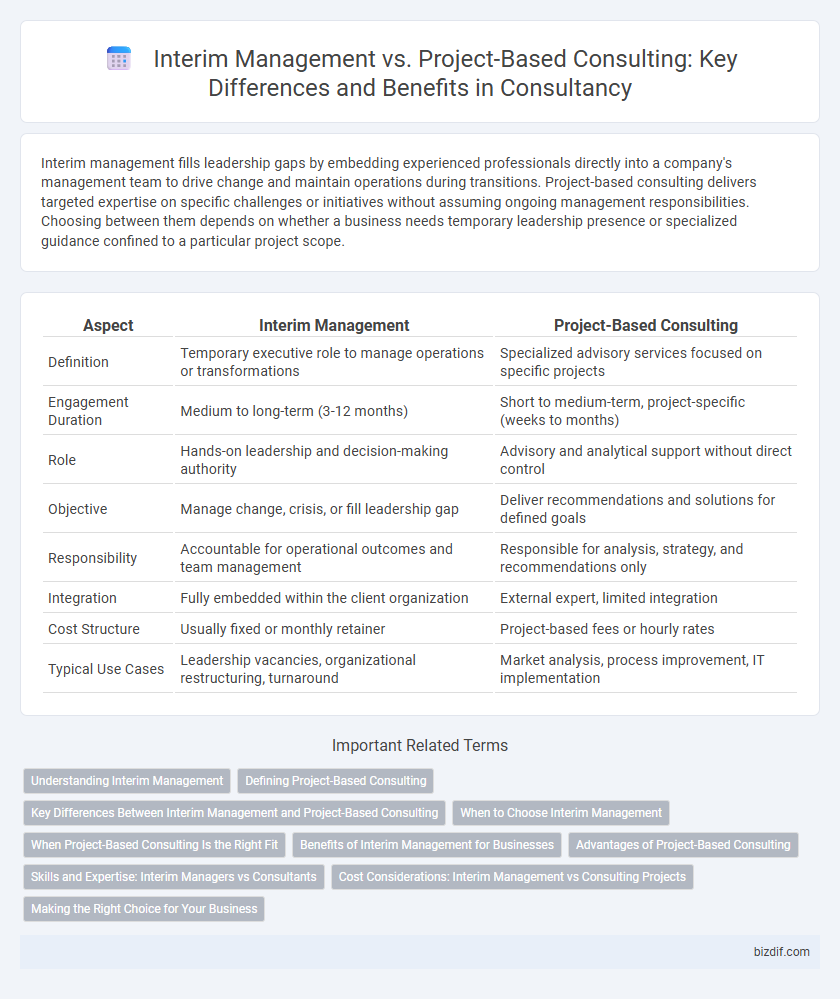Interim management fills leadership gaps by embedding experienced professionals directly into a company's management team to drive change and maintain operations during transitions. Project-based consulting delivers targeted expertise on specific challenges or initiatives without assuming ongoing management responsibilities. Choosing between them depends on whether a business needs temporary leadership presence or specialized guidance confined to a particular project scope.
Table of Comparison
| Aspect | Interim Management | Project-Based Consulting |
|---|---|---|
| Definition | Temporary executive role to manage operations or transformations | Specialized advisory services focused on specific projects |
| Engagement Duration | Medium to long-term (3-12 months) | Short to medium-term, project-specific (weeks to months) |
| Role | Hands-on leadership and decision-making authority | Advisory and analytical support without direct control |
| Objective | Manage change, crisis, or fill leadership gap | Deliver recommendations and solutions for defined goals |
| Responsibility | Accountable for operational outcomes and team management | Responsible for analysis, strategy, and recommendations only |
| Integration | Fully embedded within the client organization | External expert, limited integration |
| Cost Structure | Usually fixed or monthly retainer | Project-based fees or hourly rates |
| Typical Use Cases | Leadership vacancies, organizational restructuring, turnaround | Market analysis, process improvement, IT implementation |
Understanding Interim Management
Interim management involves placing experienced executives temporarily within an organization to lead critical initiatives or manage transitions, offering hands-on leadership and decision-making authority. This approach contrasts with project-based consulting, where consultants provide strategic advice and recommendations without directly managing teams or operations. Understanding interim management is crucial for businesses seeking swift, accountable leadership during periods of change or crisis, ensuring continuity and accelerated execution.
Defining Project-Based Consulting
Project-based consulting involves delivering specialized expertise for a specific initiative with clearly defined objectives, timelines, and deliverables. Consultants provide targeted solutions to address distinct challenges, enabling organizations to achieve measurable results within the project's scope. This approach contrasts with interim management, where an expert temporarily assumes leadership roles to drive ongoing operational improvements.
Key Differences Between Interim Management and Project-Based Consulting
Interim management involves placing experienced executives directly into client organizations to lead critical functions temporarily, ensuring continuity and hands-on decision-making during transitions or crises. Project-based consulting delivers specialized expertise through defined deliverables and strategic recommendations without assuming direct operational control. Key differences include the interim manager's embedded role with accountability for results versus consultants' advisory stance focused on analysis and guidance.
When to Choose Interim Management
Interim management is ideal when an organization requires immediate leadership to navigate transitional periods, such as mergers, crisis recovery, or rapid growth phases. This approach ensures continuity by embedding experienced executives directly within the company, offering hands-on decision-making and operational control. Organizations facing urgent challenges or needing temporary but consistent leadership typically benefit more from interim management than project-based consulting's advisory role.
When Project-Based Consulting Is the Right Fit
Project-based consulting is the ideal fit when organizations require specialized expertise for a defined scope and timeline, such as launching a new product or executing a digital transformation. This approach delivers targeted insights and actionable solutions without the long-term commitment associated with interim management. Clients benefit from measurable outcomes and strategic guidance that address specific challenges within a predetermined project framework.
Benefits of Interim Management for Businesses
Interim management provides businesses with agile leadership by embedding seasoned executives directly into their operations, ensuring rapid decision-making and continuity during pivotal transitions. This hands-on approach accelerates problem resolution and drives strategic initiatives with accountability that project-based consulting often lacks. By bridging gaps in expertise and leadership, interim managers deliver immediate value and sustain momentum in dynamic business environments.
Advantages of Project-Based Consulting
Project-based consulting offers a focused approach by delivering specialized expertise tailored to specific business objectives, ensuring measurable outcomes within a defined timeframe. This model reduces long-term costs compared to interim management by targeting precise challenges without the expense of ongoing executive presence. Companies benefit from enhanced flexibility, scalability, and access to diverse industry knowledge, which accelerates project completion and drives strategic transformation effectively.
Skills and Expertise: Interim Managers vs Consultants
Interim managers bring hands-on leadership and operational expertise, directly taking control of business functions to drive immediate results during transitions or crises. Project-based consultants offer specialized knowledge and strategic advice, focusing on analysis, recommendations, and short-term problem-solving without direct management. The key distinction lies in interim managers integrating into company leadership roles, while consultants provide external expertise to guide project execution.
Cost Considerations: Interim Management vs Consulting Projects
Interim management typically incurs higher daily rates than project-based consulting due to the seniority and full-time engagement of interim executives within an organization. Consulting projects generally offer more predictable costs based on defined scope and deliverables, enabling easier budget control and milestone-based payments. Organizations must weigh the immediate availability and integrated presence of interim managers against the flexible, task-specific nature of consulting projects when evaluating overall cost-effectiveness.
Making the Right Choice for Your Business
Interim management delivers experienced leadership by temporarily embedding senior executives to steer critical transitions, whereas project-based consulting provides specialized expertise focused on specific business challenges or objectives. Choosing between the two depends on your company's immediate needs: interim management suits organizations requiring hands-on decision-making and operational control during change, while project-based consulting is ideal for targeted problem-solving without long-term leadership integration. Assessing the urgency, scope, and desired impact of your business goals ensures the right approach drives effective performance and sustainable growth.
Interim Management vs Project-Based Consulting Infographic

 bizdif.com
bizdif.com